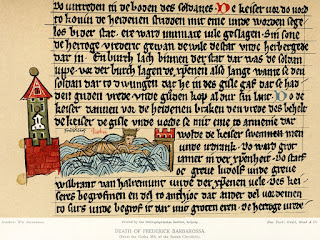Her wealth grew, as Henry granted her possessions and a generous financial gifts. She used her money to become a patron of the arts, supporting troubadours and authors of stories of courtly love. Many writers Wace was one) dedicated their works to her.
Henry traveled away from home frequently, putting down rebellions or establishing closer ties to his people. Eleanor sometimes traveled with him, and sometimes traveled around separately with their children. When he was gone and she at home, she acted as regent, sometimes with the help of the justiciar. Although contemporary historians did not write much about her life, we can see how busy she was from all the writs and court documents she signed as regent, signing herself Alienor Dei Gracia Regine Anglorum "(Eleanor by the Grace of God Queen of England").
Their first child, William, was born prior to their coronation in England. He was named William IX, Count of Poitiers. Their second child, Henry (later named "The Young King") was born 28 February 1155. She was pregnant again when Henry left England for a long absence on 10 January 1156. Not long after, the eldest son died, not yet three years old. Eleanor's pregnancy resulted in their third child and first daughter, Matilda. She took the children to France to be with their father, but they all came back to England which resulted in their fourth child, Richard (later "Lionheart") born on 8 September 1157.
Eleanor's first husband, Louis VII, had re-married and produced a daughter, Marguerite. His apparent inability to produce a male heir gave Henry the idea of joining their two kingdoms with an eye eventually to ruling both. He went to France to negotiate with Louis and to take Marguerite to foster until she was old enough to marry. Meanwhile, Eleanor had another son, Geoffrey.
When in England, Eleanor mad decisions for the court. In May 1165 she acted as his regent for Anjou and Maine while Henry as negotiating marriages with hi daughters to cement his relations with Frederick Barbarossa. Not long after, she became less involved in the affairs of state.
All their time apart from each other inspired stories of Henry's affairs. He had illegitimate children, whom he acknowledged. His eldest out of wedlock, Geoffrey of York, for instance, ultimately became an archbishop and joined the court of one of his half-brothers. Henry's best-known lover was Rosamund Clifford, the relationship with whom he acknowledged in 1174.
Although some romantic spark might have faded between the king and queen, she remained important for decades, even after moving from England and spending years apart. I'll explain tomorrow.









